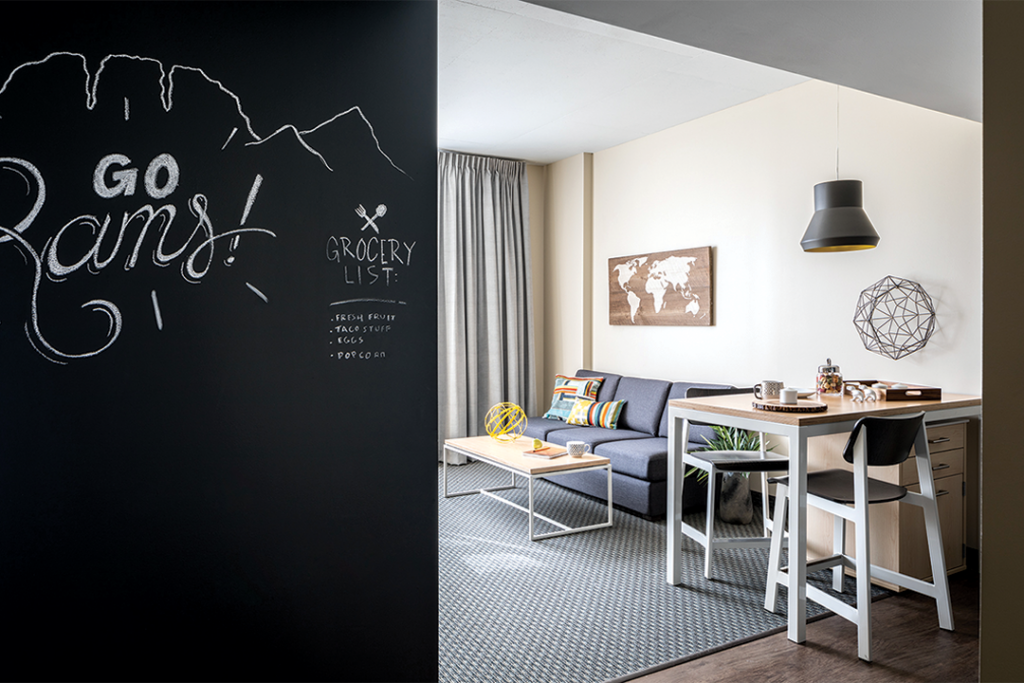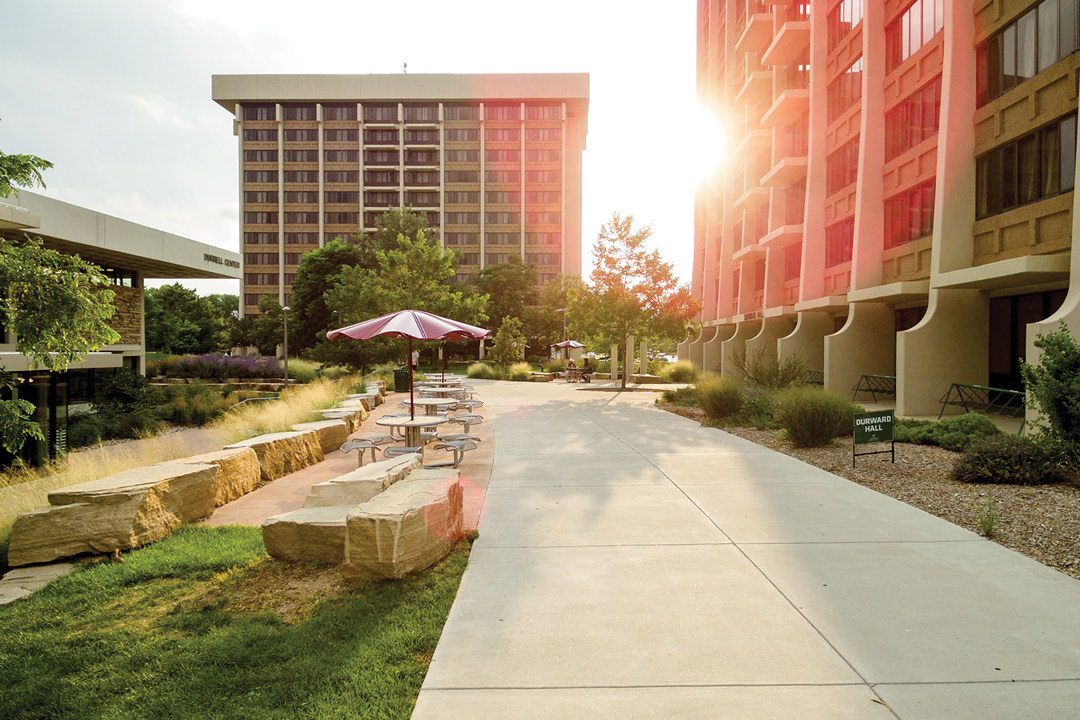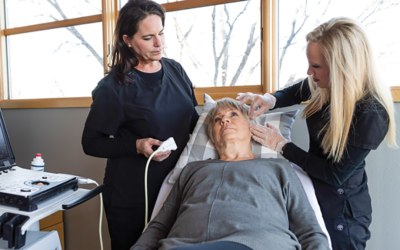Deciding what to pack for college can be a logistical nightmare. Think of it like packing for a vacation, but instead of a week-long getaway, you’re packing for a year. Knowing how much living space you’ll be allotted is a good place to start.
From the standard dorm room’s approximately 228 square feet to the relative spaciousness of an apartment or house rental, you’ll want to strike a balance between creating a homey feeling and bringing everything—including your drum set—to your new digs. You might be surprised at how much you can live without.
Dorm living
Meghan O’Leary, a recent Colorado State University graduate, moved to Fort Collins from Wisconsin for her freshman year and found that she didn’t need to bring everything from her room at home.
She helped others living the dorm life as a resident assistant (RA) during her junior and senior years. It’s something nearly all college students will experience: Most higher education institutions require that freshman under age 21 who aren’t living with their parents live on campus for the first two consecutive terms. After that, it’s up to you if you want to stay on campus or rent an apartment or house.
O’Leary shared these tips for students moving into a dorm room:
Just bring the essentials. These include a computer, backpack, desk lamp and shower caddy to stash toiletries, especially if your dorm has community bathrooms down the hall. You’ll likely be sharing showers with others, even en suite ones, so get some shower shoes to keep your feet free of fungi and viruses.
Pack lightly. Dorm closets, dressers and space under your bed may offer adequate storage for clothing, but only bring seasonal attire and favorites you know you’ll wear. If you’re living outside your home state, research your new climate and match your outfits to it. Layers work best in Colorado.
Don’t forget bedding and basic kitchen items. You’ll need two sets of twin XL sheets (it’s the standard size for most colleges, but confirm this with yours), pillows and pillowcases, a mattress topper and a comforter or quilt. You may also want some dishes and utensils for snacking, as well as a sponge and liquid dish soap.
Be prepared to clean. Dorms with
en suite bathrooms need to be cleaned in between housekeeping services, whereas community-style bathrooms get cleaned daily by staff. Bring your own cleaning supplies if you need them, or coordinate with your roommate to figure out who should bring what.
Don’t count on air conditioning. Not many dorms have air conditioning, so a box fan will be your best friend. O’Leary recommends putting the fan in your window when outside temperatures are cooler than your dorm room to pull in the air and increase circulation.
Know which items are unnecessary or banned. Don’t bring couches and large furniture to your dorm room, though a bean bag or small chair is fine. Ditch the candles, halogen lamps, LED lights with quirky messages, electric coil cooktops, toasters and ovens—all of these are fire hazards and are banned.
Rent appliances if you can. Microwaves and dorm-sized refrigerators may be available to rent from your university’s housing services (they are at CSU). That way, you don’t have to sell or donate them when you move out. And you may need one: Dining halls have varying hours, but there are usually on-campus markets that sell snacks and drinks you can heat up in your dorm room. Some dorms may even have pots and pans you can check out to use in a community kitchen.
Accept moving help. If it seems like you have a lot of stuff to move, it may not just be you and your family hauling everything to your room. Student volunteers, fraternity and sorority members and campus staff are usually available to help and answer questions during move-in.
O’Leary also recommends reaching out to your roommate before you move into the dorm so you can start building a relationship with them. Along with getting acquainted, you can work on the dorm aesthetic together.
“For me, coming from a different state and knowing who was going to bring what room elements was a relief,” O’Leary says. “We contributed together so we didn’t have two sets of things, and we color-coordinated to make a calmer, quieter vibe.”
When applying for a residence hall, students complete a questionnaire about their needs, likes and sleep and study habits to determine compatibility with potential roommates. There’s also a random roommate match, which happened to O’Leary because she applied late.
Before the semester starts, RAs provide roommate contracts, which are a blank form to set ground rules about communal living. The focus of these contracts is on room and personal boundaries, addressing time for lights out, whether music is acceptable while studying and preferences about sharing (or not sharing) each other’s appliances or food. Residents and dorms use roommate contracts as a reference if conflict arises during the school year.
“Being open about your wants and needs is important even though it’s awkward to talk with someone you’ve barely met,” O’Leary says. “Remember that this is your home for the next year. You don’t need to be best friends with your roommate, but it’s good to be comfortable and civil with each other and set a common ground for how you’re going to live.”

Photos courtesy of CSU
Living off-campus
The chances are high that college students will want to leave the dorm after their first year. At CSU, only 15 percent of students living in the dorms are returning, transfer or upper-division students, says Marianne Wieghaus, director of communications and sustainability for the university’s housing and dining services.
To accommodate the influx of off-campus students, CSU operates 58 apartment buildings that make up 1,120 units tailored to college living. The units have laundry facilities, and most are furnished. All offer greater independence than residence halls. Many other colleges also offer this type of student housing, including the University of Northern Colorado in Greeley.
However, there are some drawbacks of living off-campus, like not being able to walk to class as easily. On-campus students also tend to have higher grades and a better chance of earning a degree, says Tonie Miyamoto, director of the division of communications and sustainability for student affairs at CSU.
“But some want a yard, a dog or experience living with friends,” she says.
From cost-sharing to lifestyle differences, here are Miyamoto’s tips for moving into an off-campus house or apartment:
Read the lease. Some rentals allow individual leases while others put everyone on one lease. Student legal services can review leases to help you understand your commitment before signing. That way, you know what you can and can’t have in the rental (including pets), as well as rules surrounding snow removal, lawn care, parking and occupancy ordinances like U+2.
Define communal space. Before moving in, talk with your roommates about who’s bringing furniture, pots and pans and other shared household items. Also discuss how communal spaces will be shared, including the kitchen (and the refrigerator), closets, bathrooms and the garage, as well as any rules for cooking and cleaning up.
Have clear responsibilities. Budgeting with roommates is important when living off-campus since shared items, like dish soap, trash bags and laundry detergent, quickly add up. “If one person takes responsibility for household chores, do they get a rent discount? For most students, it’s their first experience with that level of responsibility,” Miyamoto says.
Establish house rules. Discuss your living arrangements before you move in so you don’t find yourself in an uncomfortable situation later on. There’s plenty to decide: Who gets which room? What about overnight guests? Pets? Smoking? Who’s going to shovel snow and mow the lawn? Setting the stage for a positive experience will make living off-campus more enjoyable and productive for everyone.

Photo courtesy of CSU
Bringing a car to college
Miyamoto says transportation often influences students’ decisions about where to live, and moving a car across the country (or even the state) isn’t always practical.
Cars offer a lot of freedom, but parking passes are expensive and rarely convenient due to a lack of available parking spots on campus. CSU provides free bus passes with a student ID, and Spin, a bike rental program, offers bike and e-scooter rentals by the minute through an app.
“You can start your rental in the city and end it on campus because CSU and Fort Collins share the contract,” says Miyamoto. “Some students come to campus with a car and decide it’s useful; others decide it’s easier not to have one.”
O’Leary recommends not bringing a car unless you have a specific reason to, like working an off-campus job or staying in your college town over the summer. As an RA, she didn’t bring a car to college until the second semester of her senior year. She says 80 percent of students in the dorms don’t have one.
“The campus is walkable, and with bikes and buses, it’s easy to go off-campus,” she says. “Even without knowing anyone in my freshman year, I never struggled with needing a car. There are bike racks all over campus, and they’re safe if you have a U-lock.”
Buy Used and Donate
Back-to-school shopping can get expensive, especially when it comes to furnishing a rental. Miyamoto says the CSU Surplus Property is a great place to purchase gently used office supplies that the university no longer uses. It’s open to the public year-round and has everything from desk chairs to printers, computer monitors, desk lights and organization tubs. They even sell used bikes.
Students also leave a lot of stuff behind when they move out of the dorms. To keep these items out of the landfill, CSU’s Live Green Team donates reusable furniture, bedding, clothing and small appliances to local nonprofits during move-out every spring. According to the university’s Pack it, Store it, Donate it program, over 30,000 pounds of move-out waste is kept out of the landfill each year.
Partners of the Pack it, Store it, Donate it program include Chair Table Home (a secondhand student furniture rescue in Fort Collins), Lutheran Family Services Rocky Mountains and Homeward Alliance. These organizations give the items to families in transition or put them up for resale. If you bought that dorm mini fridge instead of renting one, this is the perfect opportunity to give it away.







